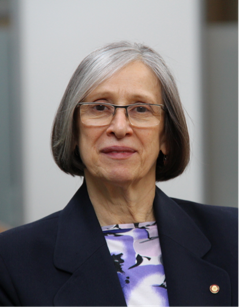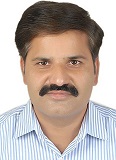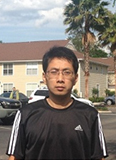
Speakers

Prof. Ljiljana Trajkovic
IEEE Fellow
Simon Fraser University, Canada
Title: Data Mining and Machine Learning for Analysis of Network Traffic
Abstract:
Collection and analysis of data from deployed networks is essential for understanding modern communication networks. Data mining and statistical analysis of network data are often employed to determine traffic loads, analyze patterns of users' behavior, and predict future network traffic while various machine learning techniques proved valuable for predicting anomalous traffic behavior. In described case studies, traffic traces collected from various deployed networks and the Internet are used to characterize and model network traffic, analyze Internet topologies, and classify network anomalies.
Biography:
Ljiljana Trajkovic received the Dipl. Ing. degree from University of Pristina, Yugoslavia, the M.Sc. degrees in electrical engineering and computer engineering from Syracuse University, Syracuse, NY, and the Ph.D. degree in electrical engineering from University of California at Los Angeles. She is currently a professor in the School of Engineering Science, Simon Fraser University, Burnaby, British Columbia, Canada. Her research interests include communication networks and dynamical systems. She served as IEEE Division X Delegate/Director, President of the IEEE Systems, Man, and Cybernetics Society, and President of the IEEE Circuits and Systems Society. Dr. Trajkovic serves as Editor-in-Chief of the IEEE Transactions on Human-Machine Systems and Associate Editor-in-Chief of the IEEE Open Journal of Systems Engineering. She served as a Distinguished Lecturer of the IEEE Circuits and System Society and a Distinguished Lecturer of the IEEE Systems, Man, and Cybernetics Society. She is a Fellow of the IEEE.

Prof. Ram Bilas Pachori
Indian Institute of Technology Indore, India
Title: Multichannel signal processing and machine learning
Abstract:
In the last one or two decades, adaptive signal decomposition techniques have gained popularity for their broad applicability to almost all fields of science and technology. Empirical mode decomposition has been proposed to decompose the signal into amplitude-frequency modulated components (basis functions). Several methods have been proposed, followed by empirical mode decomposition for adaptive decomposition and to obtain improved signal representation. Empirical wavelet transform (EWT), Fourier-Bessel series expansion-based EWT (FBSE-EWT), iterative filtering, variational mode decomposition are a few popular techniques among adaptive decomposition techniques. Recent advancements in sensor technology make it easier to acquire signals from multiple sources simultaneously, which demands multivariate signal decomposition methods. The univariate iterative filtering has been extended for processing multichannel signals, which will be discussed in this talk. Also, applications of multivariate iterative filtering and machine learning in brain-computer interface and schizophrenia detection from multichannel electroencephalogram (EEG) signals will be presented. The obtained results show the effectiveness of the discussed multivariate adaptive signal decomposition techniques.
Biography:
Ram Bilas Pachori received the B.E. degree with honours in Electronics and Communication Engineering from Rajiv Gandhi Technological University, Bhopal, India, in 2001, the M.Tech. and Ph.D. degrees in Electrical Engineering from IIT Kanpur, India, in 2003 and 2008, respectively. Before joining the IIT Indore, India, he was a Post-Doctoral Fellow at the Charles Delaunay Institute, University of Technology of Troyes, France (2007-2008) and an Assistant Professor at the Communication Research Center, International Institute of Information Technology, Hyderabad, India (2008-2009). He was an Assistant Professor (2009-2013) and an Associate Professor (2013-2017) at the Department of Electrical Engineering, IIT Indore, where he has been a Professor since 2017. He is also associated with the Center for Advanced Electronics, IIT Indore. He was a Visiting Professor at the Department of Computer Engineering, Modeling, Electronics and Systems Engineering, University of Calabria, Rende, Italy, in July 2023; Faculty of Information & Communication Technology, University of Malta, Malta, from June 2023 to July 2023; Neural Dynamics of Visual Cognition Lab, Free University of Berlin, Germany, from July 2022 to September 2022; School of Medicine, Faculty of Health and Medical Sciences, Taylor’s University, Malaysia, from 2018 to 2019. Previously, he was a Visiting Scholar at the Intelligent Systems Research Center, Ulster University, Londonderry, UK, in December 2014. His research interests include signal and image processing, biomedical signal processing, non-stationary signal processing, speech signal processing, brain-computer interface, machine learning, and artificial intelligence and the internet of things in healthcare. He is an Associate Editor of Electronics Letters, IEEE Transactions on Neural Systems and Rehabilitation Engineering, and Biomedical Signal Processing and Control, and an Editor of IETE Technical Review journal. He is a Fellow of IETE, IEI, and IET. He has 315 publications, which include journal articles (192), conference papers (87), books (10), and book chapters (26). He has also eight patents, including one Australian patent (granted) and seven Indian patents (published). His publications have been cited approximately 15,000 times with h-index of 66 according to Google Scholar.

Prof. Haiquan Zhao
IEEE Senior Member
Southwest Jiaotong University, China
Title: Robust adaptive filter with EIV models and its application
Abstract:
As an important part of signal processing, adaptive filtering has been widely used in many fields, including communications, radar, power system and biomedical. In practical applications, such as when a worker samples the input, errors may occur, causing the input signal to suffer from noise interference. The total least-squares (TLS) method is an effective way to deal with the errors-in-variables (EIV) model. All are based on Gaussian background noise design, and performance deteriorates in the Non-Gaussian noise environment. This topic shares our recent research findings how to enhance the robustness of algorithms against impulsive noise under acoustic echo cancellation(AEC) and system identificaiton.
Biography:
Zhao Haiquan, Doctor of Engineering, professor, doctoral supervisor, senior member of IEEE and Chinese Institute of Electronics, academic and technical leader in Sichuan Province, outstanding expert with outstanding contributions in Sichuan Province, winner of Sichuan Outstanding Youth Fund and core member of Sichuan Youth Science and Technology Innovation Team, Won the First Prize of Natural Science of CAA of Chinese Society of Automation in 2019 (ranked 3rd), the second Prize of Natural Science of CAA of Chinese Society of Automation in 2018 (ranked 1st), the second Prize of Science and Technology Progress of the Ministry of Education (ranked 3rd), and the 12th Jeme Tianyou Railway Science and Technology Award - Youth Award. The 9th Jeme Tianyou Science and Technology Award of Ministry of Railways - Jeme Tianyou Special Award of Southwest Jiaotong University, Tang Lixin Outstanding Scholar Award; Executive Director of Provincial Science and Youth Federation, member of Sichuan Youth Federation, Executive director of Chengdu Knowledge Association. Serves on the editorial board of international journals such as Signal Processing.

Prof.Brian A. Barsky
University of California, Berkeley, CA, USA
Title: Boeing 737 MAX: Money, Machines, and Morals in Conflict
Abstract:
Within two years of its first commercial flight, the Boeing 737 MAX aircraft suffered two crashes within five months of each other. In both incidents, pilots could not control the aircraft shortly after takeoff resulting in tragic crashes with no survivors. Despite the similar characteristics of the two crashes, the FAA resisted international pressure to ground the aircraft, but then grounded it for nineteen months.
Due to concerns about financial losses, there was pressure to resume the use of the 737 MAX for commercial passenger flight as soon as possible notwithstanding continued safety concerns. The FAA ungrounded it in November 2020, despite many lingering safety questions. Examination of the many factors that led to these disastrous consequences illuminates disquieting ethical issues of corporate behavior and lack of government oversight. The crashes were due to a flawed design and there is a complex web of concerns involved. At the heart of the tragedy is an ill-conceived automated computer software approach to a flawed aerodynamic design called the Maneuvering Characteristics Augmentation System, or MCAS.
In this talk, Prof. Barsky will elucidate how these tragedies were the consequence of a corporation prioritizing profits over safety as well as of regulatory capture of the government agency which was derelict in its duty to protect the flying public.
Biography:
Brian A. Barsky is Professor of the Graduate School at the University of California, Berkeley where he is a Warren and Marjorie Minner Faculty Fellow in Engineering Ethics and Professional/ Social Responsibility. Prof. Barsky has faculty affiliations in Electrical Engineering and Computer Sciences (EECS), Optometry, Vision Science, Bioengineering, the Berkeley Institute of Design (BID), the Berkeley Center for New Media (BCNM), the Arts Research Center (ARC), and the Berkeley Canadian Studies Program. He attended McGill University in Montréal, where he received a D.C.S. in engineering and a B.Sc. in mathematics and computer science. He studied computer graphics and computer science at Cornell University in Ithaca, where he earned an M.S. degree. His Ph.D. degree is in computer science from the University of Utah in Salt Lake City. His research interests include computational photography, contact lens design, computer methods for optometry and ophthalmology, image synthesis, computer aided geometric design and modeling, CAD/CAM/CIM, interactive and realistic three-dimensional computer graphics, visualization in scientific computing, computer aided cornea modeling and visualization, medical imaging, vision correcting displays, and virtual environments for surgical simulation.

Assoc. Prof. Lei Chen
Shandong University, China
Title: Multidimensional Path Aggregation Network for Spatio-temporal Action Location
Abstract:
With the increasing popularity of surveillance devices, there is a growing demand for intelligent action recognition. Spatio-temporal action localization has gradually become an important application of deep learning in computer vision. Compared with the usual sense of action recognition, spatio-temporal action localization task can anchor all kinds of behaviours and individuals from time and space. Traditional spatio-temporal action location algorithms have the problem of insufficient fusion ability for spatio-temporal feature extraction and incomplete application of information at various levels. How to extract spatio-temporal action features more efficiently for detection under the condition of ensuring real-time inference speed, the solution of these problems will greatly promote the development and application of spatio-temporal behavioural localization algorithms. To address the problem, we design a multidimensional path aggregation network for spatio-temporal action location, which aggregates the features of multiple paths and fuses the corresponding hierarchical features to obtain spatio-temporal behavioural features. The experimental results demonstrate better performance compared with other algorithms.
Biography:
Lei Chen received the B.Sc. and M.Sc. degrees in electrical engineering from Shandong University, Jinan, China, and the Ph.D. degree in electrical and computer engineering from University of Ottawa, Ontario, Canada. He is currently an Associate Professor with the School of Information Science and Engineering, Shandong University, China. His research interests include image processing and computer vision, visual quality assessment and pattern recognition, machine learning and artificial intelligence. He was the principal investigator of projects granted from the National Natural Science Foundation of China, National Natural Science Foundation of Shandong Province, China Postdoctoral Science Foundation, etc. He has published more than 40 papers on top international journals and conferences in recent years including IEEE TIP, Signal Process., ICME, etc. He was awarded the Future Plan for Young Scholars of Shandong University. He served for many international conferences including the ICIGP 2021, CSAI2022, MLCCIM2022, and ICIVC 2023 as Program Chair, Technical Chair or Publicity Chair.